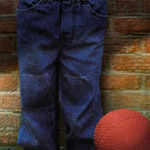 I’ve never seen anything like it: Dale jogs with his arms by his sides, not unlike an Irish step dancer. So, as much as I enjoy spending time with him otherwise, the time came when I had to tell him that our jogging relationship was over. I don’t think I’m being frivolously judgmental in severing a doomed partnership because Dale won’t assume the appropriate jogging form. Whether or not my decision is a good one is immaterial–every innate instinct tells me this is the right decision. There’s a right way to jog and there’s a wrong way to jog. If Dale isn’t interested in investing the effort required to put up his jogging dukes, who is he fooling?
I’ve never seen anything like it: Dale jogs with his arms by his sides, not unlike an Irish step dancer. So, as much as I enjoy spending time with him otherwise, the time came when I had to tell him that our jogging relationship was over. I don’t think I’m being frivolously judgmental in severing a doomed partnership because Dale won’t assume the appropriate jogging form. Whether or not my decision is a good one is immaterial–every innate instinct tells me this is the right decision. There’s a right way to jog and there’s a wrong way to jog. If Dale isn’t interested in investing the effort required to put up his jogging dukes, who is he fooling?
“You’re not kidding?” he asked after I’d made my announcement. “What’s the deal?”
I shrugged. “I told you why, and I’m sorry, but… it’s just not right for me, the way you jog. It’s just wrong.”
Dale stood stock still, his head cocked to the side as if that might make it easier for my words to penetrate. Then, “So… it’s about vanity? I don’t get it. Assuming I’m not moving my arms the right way, you’re worried that people will think we’re… what, deviants?”
“It’s not vanity at all. The way you run is conspicuous the same way that someone chewing without removing the fork from their mouth would be conspicuous. Naturally, it draws the attention of onlookers, and, frankly, I’d rather not be noticed like that. That’s not vanity.”
“But your base concern is superficial, isn’t it?”
“This isn’t about wearing the wrong color shorts or not having the coolest haircut,” I said.
“No, I mean, isn’t this like… casting out a friend because they’re knock-kneed?”
I shook my head. “I’m talking about a choice here, an indefensible choice. You and I are no different physically, yet you’re running with your arms pinned to your sides, why? Is it because you’d be flung off balance into a ditch otherwise? No, it’s because that’s how you choose to conduct yourself. I mean, if you smoked a pipe while we were jogging, or… if you insisted on wearing a feathered headdress, then I’d have to take the same considerations, wouldn’t I?”
“But where do you draw the line?”
“Well, here is one place where I draw the line,” I said. “The line is drawn.”
Determining interpersonal relationships based upon unreasonable criteria is a recipe for a solitary existence. I know that. I merely expect a modicum of social propriety. This is a long-standing principle of mine, and it’s always stood me in good stead.
I was only 10 when our father moved to a new house in the suburbs, and my younger brother and I took the opportunity to creature around the neighborhood to get the lay of the land. Before long we were approached by a boy around my age who invited us into his home to see his dad’s piranha–a promising start to a provisional friendship.
After some friendly chat the three of us headed back out into the summer heat so the boy could show us his favorite spots, including an impressive rope swing over a deep creek, and a nicely-appointed fort in the crook of a dead tree. “Do you guys climb?” the boy asked. My brother and I glanced at each other, then shook our heads. “Trees,” he clarified, indicating the branches above. “I climb all the time. I never wear shoes.”
Indeed, the soles of his feet were like dried leather. As he scaled the tree the bark stripped away to reveal spiky pulp, but his feet were so tough that the splinters bent back like dry grass. I winced with amazement: my own tender feet would have been instantly impaled.
My brother and I craned our heads back to follow the boy’s progress, and that’s when things took an unfortunate turn. Like a wee baby gerbil emerging from its bed of cedar, a single pink testicle greeted us both from the boy’s red shorts. To my horror I found myself unable to turn away for a moment, standing agape as the boy’s vertical thrusts all but assured the wayward scrotum’s imminent and glorious freedom. The boy’s utter obliviousness to this anatomical travesty only made it that much worse.
When I looked over at my brother he was already looking back at me, and there was suddenly no need for communication. A primal need for survival had kicked in and we were of a single mind. When we turned to leave it was perfunctory, the way you leave the theatre when the curtain slides closed and the lights come up.
“Hey! Guys?” The boy was fifteen feet from the ground, and straddling the trunk of the tree like a koala. I turned around without breaking from our retreat. “Where are you going? You wanna do something else?”
“No, that’s okay,” I said, realizing only then that we would never know the boy’s name. “We have another thing we have to go to now, so, we’re gonna-”
“Okay, I’ll see you next time, okay?”
You have to draw the line somewhere though. Even a child knows that.
 I went with L. to check out the new neighborhood café. Ten minutes later our clever banter had reached a natural pause over antipasti, and I took advantage of the fermata to enjoy the bistro’s ambience of carefully-orchestrated comfort. Candles glowed, glasses tinked, and tendrils of conversation wafted over from satellite tables. Lapses in conversation are inevitable, like rests in music. And, inasmuch as they afford one the opportunity to listen, I welcome the lapses. When they come, the other senses can reach outward to compensate, and it’s important not to overlook these moments as opportunities for future conversation.
I went with L. to check out the new neighborhood café. Ten minutes later our clever banter had reached a natural pause over antipasti, and I took advantage of the fermata to enjoy the bistro’s ambience of carefully-orchestrated comfort. Candles glowed, glasses tinked, and tendrils of conversation wafted over from satellite tables. Lapses in conversation are inevitable, like rests in music. And, inasmuch as they afford one the opportunity to listen, I welcome the lapses. When they come, the other senses can reach outward to compensate, and it’s important not to overlook these moments as opportunities for future conversation. Liz breezes in and catches the edge of my office door as if fighting the hall tide. “Hey, you have those photos ready from yesterday’s shoot?”
Liz breezes in and catches the edge of my office door as if fighting the hall tide. “Hey, you have those photos ready from yesterday’s shoot?” My friend returned from her vacation with skin the color of apricot honey. “Wow,” I said, and proceeded to ignore her recounting of exotic locales and leisure pursuits. The change in her complexion was profound, but more than that, her countenance glowed with a vitality that made her seem more real. She was transformed, and I couldn’t help but to comment again. “I can’t get over how healthy you look. I guess that’s it.”
My friend returned from her vacation with skin the color of apricot honey. “Wow,” I said, and proceeded to ignore her recounting of exotic locales and leisure pursuits. The change in her complexion was profound, but more than that, her countenance glowed with a vitality that made her seem more real. She was transformed, and I couldn’t help but to comment again. “I can’t get over how healthy you look. I guess that’s it.” At a family reunion dinner, my great grandfather–a man who was, to me, as noble as a silverback gorilla–ground his molars mercilessly. Our relationship at the time was such that he would occasionally drop tidbits of age-old wisdom on me, and I would not let on that my pockets were stuffed full of colorful summer beetles that I had collected from his garden. It’s fair to say that we weren’t exactly on the same wavelength. But as inscrutable as the old man was, when it came down to such basics as the feeding process, any mystique he’d cultivated just went out the window. Whether he was processing steak gristle or apple sauce, I endured the sound of rhythmic pulverization for the length of the dinner. It seemed impossible that this had been going on for eight decades. No, more likely he had simply reached a point where he knew just how long he needed to last, so why not use it up? To end on zero, there’s nobility in that, surely.
At a family reunion dinner, my great grandfather–a man who was, to me, as noble as a silverback gorilla–ground his molars mercilessly. Our relationship at the time was such that he would occasionally drop tidbits of age-old wisdom on me, and I would not let on that my pockets were stuffed full of colorful summer beetles that I had collected from his garden. It’s fair to say that we weren’t exactly on the same wavelength. But as inscrutable as the old man was, when it came down to such basics as the feeding process, any mystique he’d cultivated just went out the window. Whether he was processing steak gristle or apple sauce, I endured the sound of rhythmic pulverization for the length of the dinner. It seemed impossible that this had been going on for eight decades. No, more likely he had simply reached a point where he knew just how long he needed to last, so why not use it up? To end on zero, there’s nobility in that, surely. How many individual things are we able to remember at once–without resorting to unholy trickery, that is? At any given time, the experts will tell you, we can keep between five and nine things in mind, on average. That’s another interesting piece of trivia to tuck away, but it’s actually not what I’m talking about. I mean what is the sum total of things that we can know? Is there an end to it? We must assume there is an upper limit, owing to the brain’s finite mass. And if a brain is like my attic then we must also assume that, as it reaches maximum capacity, it’s not so much the size of the object you’re trying to stuff up there, but the shape of it as well. Any new thought, in other words, would have to be able to fit in among the other notions, in form as well as size. It follows then that at some point you can only accept certain types of information, which, considering my elders, is just about as accurate a theory as any other I’ve been able to devise.
How many individual things are we able to remember at once–without resorting to unholy trickery, that is? At any given time, the experts will tell you, we can keep between five and nine things in mind, on average. That’s another interesting piece of trivia to tuck away, but it’s actually not what I’m talking about. I mean what is the sum total of things that we can know? Is there an end to it? We must assume there is an upper limit, owing to the brain’s finite mass. And if a brain is like my attic then we must also assume that, as it reaches maximum capacity, it’s not so much the size of the object you’re trying to stuff up there, but the shape of it as well. Any new thought, in other words, would have to be able to fit in among the other notions, in form as well as size. It follows then that at some point you can only accept certain types of information, which, considering my elders, is just about as accurate a theory as any other I’ve been able to devise. The first time we visited the progressive suburban creperie, we’d allowed ourselves just enough time to eat before the late evening movie. Nestled in the crook between the faux rusticana post-antique used junk store and the self-consciously over-exotic soap and bong shop, the restaurant was the most convenient place to grab a bite, since it was right across the street.
The first time we visited the progressive suburban creperie, we’d allowed ourselves just enough time to eat before the late evening movie. Nestled in the crook between the faux rusticana post-antique used junk store and the self-consciously over-exotic soap and bong shop, the restaurant was the most convenient place to grab a bite, since it was right across the street. The Physics professor takes his place at my side five minutes later than usual. If the rest of the crew at the metro stop notices Nathaniel Whippingposte’s tardiness you could never gauge it from their outward appearances. Acknowledgement would be crossing that delicate social boundary that keeps a morning commuter safe from commitment. In all honesty, I can’t be certain that the man next to me is a physics professor at all, nor even that his name is “Nathaniel Whippingposte,” because I’ve never actually spoken to him. It’s not to say that we live in a society of strangers. In fact, I call this motley collection of characters “the crew” because we’re that tight-knit. We’re the regulars. Sure, there are the travellers through, the one-time companions, the sight-seers, but the core group remains. More than that, we all tend to stand in exactly the same spots from morning to morning, scattered, and equidistant from one another. Physics professor might call that a stochastic diffusion.
The Physics professor takes his place at my side five minutes later than usual. If the rest of the crew at the metro stop notices Nathaniel Whippingposte’s tardiness you could never gauge it from their outward appearances. Acknowledgement would be crossing that delicate social boundary that keeps a morning commuter safe from commitment. In all honesty, I can’t be certain that the man next to me is a physics professor at all, nor even that his name is “Nathaniel Whippingposte,” because I’ve never actually spoken to him. It’s not to say that we live in a society of strangers. In fact, I call this motley collection of characters “the crew” because we’re that tight-knit. We’re the regulars. Sure, there are the travellers through, the one-time companions, the sight-seers, but the core group remains. More than that, we all tend to stand in exactly the same spots from morning to morning, scattered, and equidistant from one another. Physics professor might call that a stochastic diffusion. “Come on, we need a fourth man!” That’s funny. Man. We were no older than eight, and already my friends had appropriated the language of their fathers. But, much as I hated to, I was going to disappoint them on this day. There was no way I was going to run around the playground in the miasma of high-noon, not when I was wearing my Toughskins jeans. I just stared at my feet and remained against the schoolhouse wall in the shade of the eaves.
“Come on, we need a fourth man!” That’s funny. Man. We were no older than eight, and already my friends had appropriated the language of their fathers. But, much as I hated to, I was going to disappoint them on this day. There was no way I was going to run around the playground in the miasma of high-noon, not when I was wearing my Toughskins jeans. I just stared at my feet and remained against the schoolhouse wall in the shade of the eaves. I wave at my coworker from across the busy car park, and she takes it as an invite and makes a beeline for me. Wait, why is she carrying a motorcycle helmet? Because this girl isn’t who I thought she was. It’s that new girl who, admittedly, bears a slight resemblance to my coworker. But only from twenty yards. My bloody nearsightedness has betrayed me on more than one occasion, which is why I’ve gotten into the habit of not making eye contact with anyone. Generally I try to look like I’m lost in thought–better safe than sorry. For the eccentric artist there are many things to ponder, after all. But this time I was so… sure.
I wave at my coworker from across the busy car park, and she takes it as an invite and makes a beeline for me. Wait, why is she carrying a motorcycle helmet? Because this girl isn’t who I thought she was. It’s that new girl who, admittedly, bears a slight resemblance to my coworker. But only from twenty yards. My bloody nearsightedness has betrayed me on more than one occasion, which is why I’ve gotten into the habit of not making eye contact with anyone. Generally I try to look like I’m lost in thought–better safe than sorry. For the eccentric artist there are many things to ponder, after all. But this time I was so… sure.